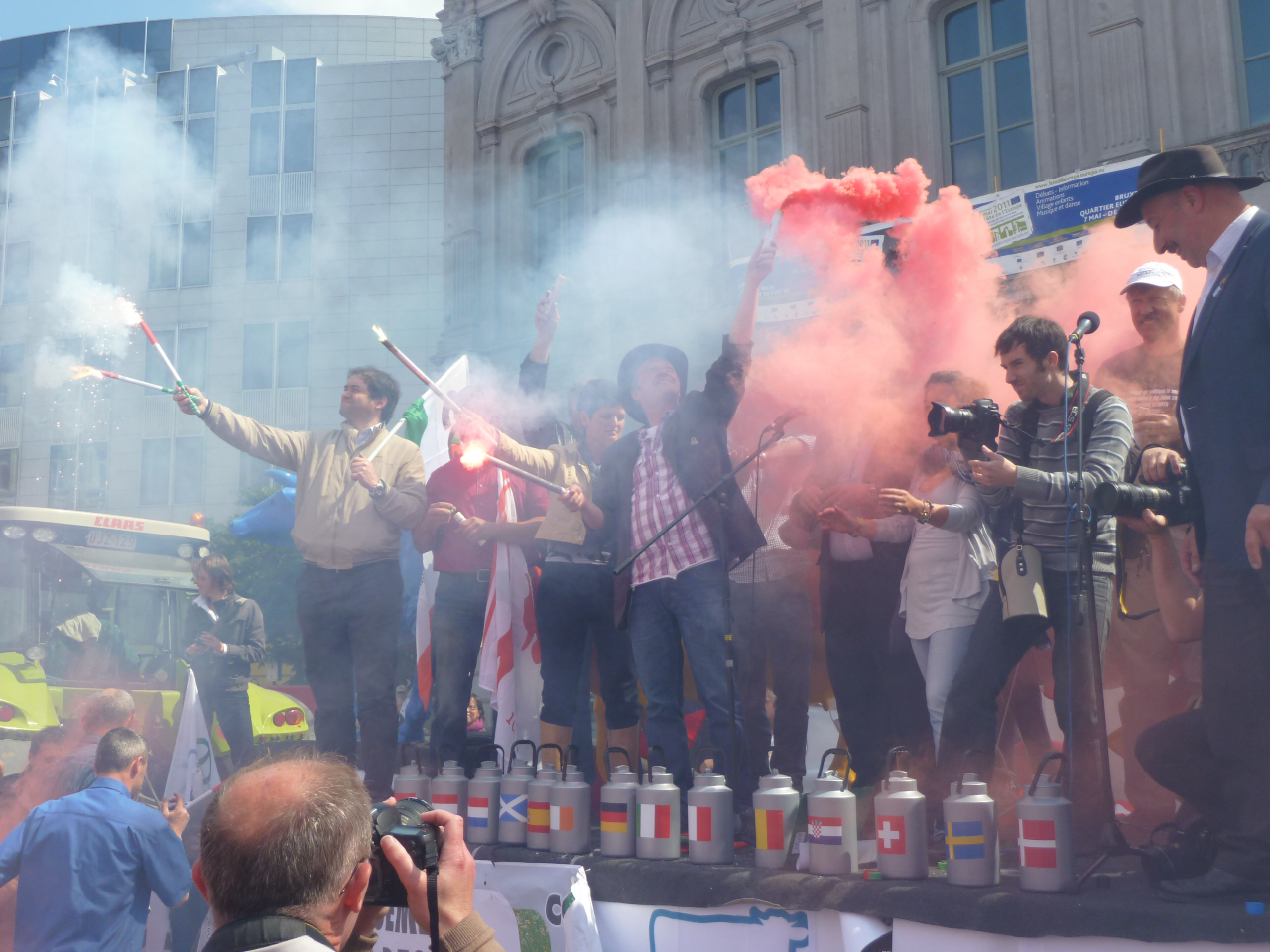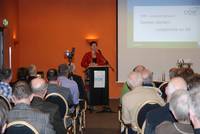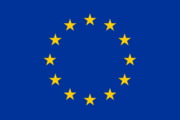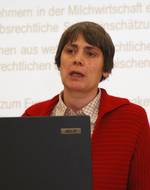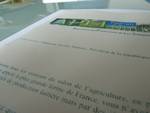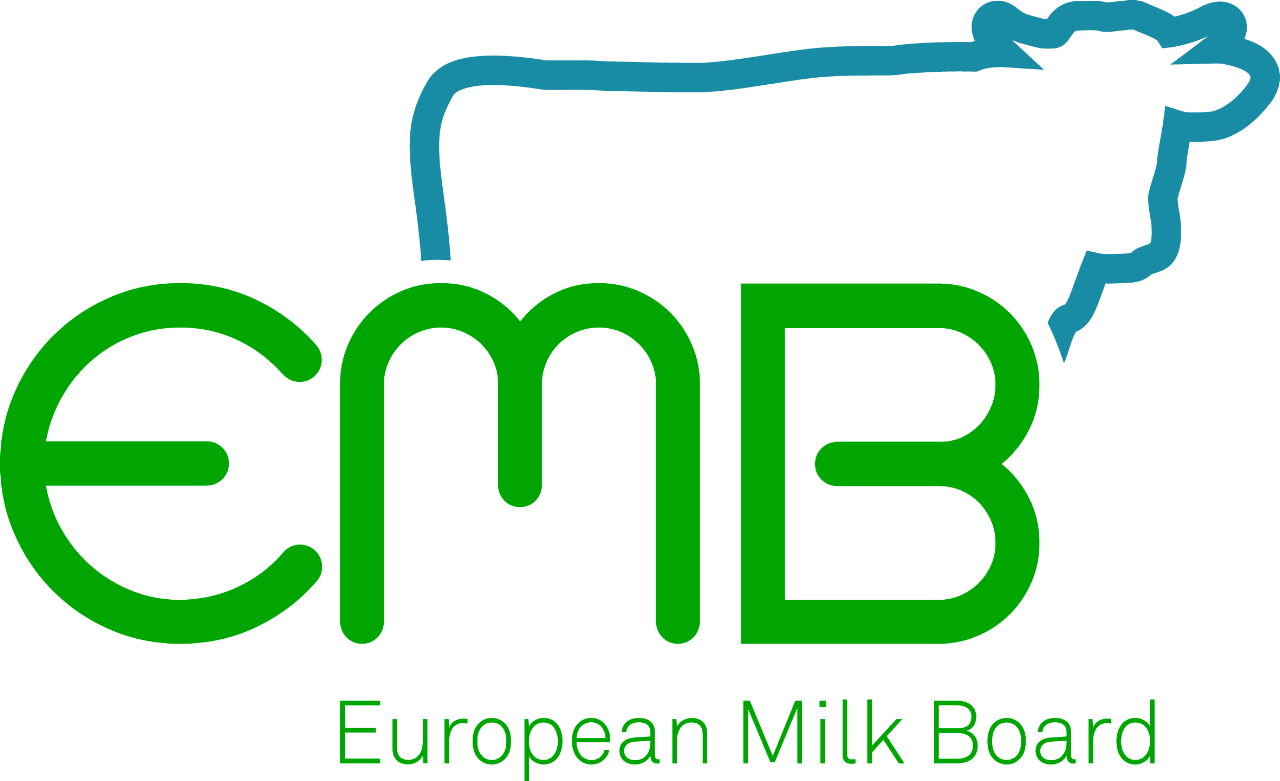EMB Newsletter April 2012
Newsletter as PDF
Contact
European Milk Board
Bahnhofstr. 31
D-59065 Hamm
Phone: 0049/2381/4360495
Fax: 0049/2381/4361153
E-Mail: office@europeanmilkboard.org
Website: http://www.europeanmilkboard.org
Newsletter as PDF
Contact
EMB - European Milk Board asbl
Rue de la Loi 155
B-1040 Bruxelles
Phone: +32 - 2808 - 1935
Fax: +32 - 2808 - 8265
Dear Dairy Farmers and Interested Parties,
The European Milk Board (EMB) elected a new Board at its Members’ Meeting last month. The members also entrusted me with this important office. So I would like to take this opportunity to introduce myself briefly; my colleagues on the new Board will emulate me in subsequent issues of the EMB Newsletter.
My name is Erna Feldhofer, I’m 42 years old and have been the President of IG-Milch in Austria since November 2010. With my family I manage a Simmental breeding farm full time. Our farm is 820 metres above sea level in Styria, Austria.
A member of IG-Milch’s Board for many years, I already had the opportunity to attend EMB Members’ Meetings on a number of occasions. What I find particularly interesting and impressive is finding out the situation of farms in the individual countries by speaking to farmers face-to-face. But it is also appalling to realise that farmers everywhere are in the same boat. Cost-covering milk production is not possible anywhere. I find it striking that jobs and livelihoods are being destroyed through the arbitrary actions of the very political institutions that were set up for the benefit of their citizens.
What I regard as particularly outrageous is that the general political conditions are quite obviously always created in such a way that the raw material milk ends up being cheap. Dairy farmers are left to their own devices in a free market which in reality is not at all free. The dairy farmers’ situation is very tense throughout the EU. With the reform of the common agricultural market organisation, significant political decisions are to be taken soon.
That is why it is even more important to organise on a pan-European basis. The European Milk Board gives this opportunity, and I am glad to be doing my bit as a new member of the Board. For the stronger this organisation is, the more each individual will benefit!
Yours,
Erna Feldhofer
(President of IG-Milch Austria and member of the EMB Board)
European Milk Board Members’ Meeting sets the course for the future of the dairy farmer movement in Europe
The half-yearly Members’ Meeting of the European Milk Board (EMB) was held in Brussels on 12/13 March. Representatives of the national member organisations elected a new Board and determined the EMB strategy towards policy-makers and civil society.
As in previous years, the EMB Members’ Meeting brought together old acquaintances and new colleagues from the national member organisations to discuss the current situa¬tion of dairy farmers in Europe, exchange experiences and define the guidelines for the future work of the EMB on a European level. On the first day, the Dutch EMB Vice-President Sieta van Keimpema reported on the EMB’s activities last year, such as the numerous talks with agricultural policy-makers in Brussels and various European capital cities, and the EMB’s stands at agricultural fairs like Green Week in Berlin.
Dairy farmers very active in Europe again this spring – join in!
The weather is getting better, spring is just around the corner, and as ever the members of the European Milk Board and the national dairy farmer organisations throughout Europe are very active with events, campaigns and demonstrations. Only if we are seen will we be heard. That goes especially for EU politics, because to have a say in Brussels the pressure has to come from the grass roots. Ideally that means starting from right behind the farm gate. That is the only way to ensure that our own government and our MEP from the region deliver our message in Brussels.
European Milk Board elects new Board
The members of the European Milk Board (EMB) elected a new Executive Committee at their Members’ Meeting in Brussels on 13 March. The seven members of the Board are all active dairy farmers and will be at the helm of the EMB for the next two years.
President Romuald Schaber, Germany
Long-standing Board member Romuald Schaber from Germany was re-elected President of the EMB for the third time. The state-certified farm manager was born in Petersthal in the Allgäu region in 1957 and took on his parents’ dairy farm in 1986; it now has 40 cows. He is married with five children.
“Stronger together” symposium – DBB gathers the dairy sector around the table
On 17 March, the Dutch Dairymen Board (DDB) organised a symposium entitled “Stronger together” in Eemnes, the Netherlands. The programme compiled for the event was extremely interesting and featured top speakers. The symposium gave the DDB members a rare opportunity for a cross-sectoral discussion with various lobby groups and decision-makers from the dairy sector such as the Presidents and Vice-Presidents of the three largest Dutch dairy co-operatives, dairy industry managers, representatives of the marketing board for dairy products, scientists and officials from the Dutch Ministry of Agriculture. The Board of the DDB is proud of this successful event, one that was much appreciated by a wide audience.
Stop the senseless increase of the milk quota
The European Milk Board (EMB) is sending a letter to the Ministers of Agriculture of the European Union, the Members of the European Parliament and the Members of the national Parliaments. In this letter it points out that the planned 1% increase in the milk quota on 1 April 2012 makes no sense*. The farm-gate prices for milk are already under pressure throughout Europe, and a further increase in the production volume would only exacerbate the situation in the markets.
The dairies’ competition for milk “underdeveloped”
The German Federal Cartel Office regards the farmers’ chances of being able to change dairy and sell to another company as now severely limited. At the Milk Conference organised by the Arbeitsgemeinschaft bäuerliche Landwirtschaft (AbL), the Katholische Landjugend (KLJB) and the University of Kassel on 5 March, Eva-Maria Schulze from the Federal Cartel Office pointed to two key reasons:
Contractualisation – French dairy farmers accuse
The French presidential elections are being held on 22 April this year. There may be a second ballot on 6 May. Given this scenario the Association des Producteurs de Lait Indépendants (APLI) is sending an open letter to French President Nicolas Sarkozy.
In its letter APLI highlights the pressing problems of obligatory contracts (contractualisation) to be signed between milk producers and dairies or co-operatives enshrined in a ministerial decree of December 2010. The dairy farmers demand that the resultant precarious economic situation in France be acknowledged and rectified. French dairy farmers and their families must be able to return to economically acceptable and decent living conditions.
EMB Calendar
Please find here some of the most important meetings of the EMB executive board in April:
- 16.-18.04.: Meeting with dairy farmers in Poland
- 19.04.: Market introduction of the fair icecream in Belgium
- 20.04.: EMB board meeting in Brussels
- 26.04.: Tractor convoy in Constance organised by BDM in Germany
Full Texts
European Milk Board Members’ Meeting sets the course for the future of the dairy farmer movement in Europe
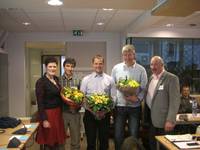 |
The half-yearly Members’ Meeting of the European Milk Board (EMB) was held in Brussels on 12/13 March. Representatives of the national member organisations elected a new Board and determined the EMB strategy towards policy-makers and civil society.
As in previous years, the EMB Members’ Meeting brought together old acquaintances and new colleagues from the national member organisations to discuss the current situa¬tion of dairy farmers in Europe, exchange experiences and define the guidelines for the future work of the EMB on a European level. On the first day, the Dutch EMB Vice-President Sieta van Keimpema reported on the EMB’s activities last year, such as the numerous talks with agricultural policy-makers in Brussels and various European capital cities, and the EMB’s stands at agricultural fairs like Green Week in Berlin.
That a market needs moral rules for it to work properly was confirmed in a very interesting presentation by Professor Lütge from Munich University of Technology in keeping with the spirit of the European dairy farmers. In addition, reports on progress made in the “Fair Milk” project were presented from the member countries, all very encouraging for the future of the project. After introductory words from the Belgian Board member Erwin Schöpges and exhaustive discussion, the members agreed to proceed in a twin-track manner with the future strategy of the EMB. Firstly, the successful campaigns and talks with European politicians are to be continued; secondly, a start is to be made on uniting milk producers on a European level, the possibility of which was opened up by the EU Milk Package adopted in January.
The focus of the second day was the election of a new EMB Board for the next two years. In the election of the Board members for the first time the EMB member states were subdivided into Northern, Southern, Western and Central/Eastern European groups of countries to ensure a balanced regional distribution of Board members. The main feature of the discussion in the run-up to the election was commitment to and strong personal identification with the EMB’s aims. In three ballots Romuald Schaber (BDM, Germany) and Sieta van Keimpema (DDB, Netherlands) were re-elected President and Vice-President respectively. Roberto Cavaliere (APL, Italy) and Erwin Schöpges (MIG, Belgium) were likewise returned as members of the Board. New Board members are Richard Blanc (APLI, France), Erna Feldhofer (IG-Milch, Austria) and John Comer (ICMSA, Ireland).
After two days of hard work all participants were able to head off home with the feeling that the EMB is well geared up to the future in terms of strategy and staff. Now we can start the other tasks to achieve the aim of a fair market structure for dairy farmers in Europe, one that secures their livelihood.
Christian Schnier (EMB)

